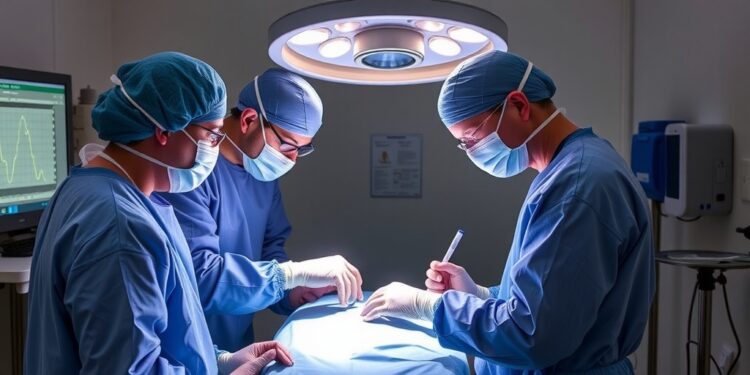
Researchers at the University of Virginia (UVA) Health have developed a groundbreaking nanotechnology-based drug delivery system that has shown promising results in preventing complications associated with surgeries for heart and dialysis patients. This innovation, known as “Pericelle,” utilizes a hydrogel paste infused with nanoparticles, applied during initial vein surgeries. The objective is to inhibit the formation of dangerous blockages that frequently necessitate repeated surgical interventions—a severe burden for many patients requiring ongoing treatments.
The emergence of Pericelle offers a potential solution to an enduring medical challenge. Often, when surgeons perform revascularization procedures to enhance blood flow, such as grafting veins for heart surgeries, complications arise that ironically lead to inadequate blood circulation. This paradox—where a surgical solution exacerbates the very problem it aims to solve—undermines patient outcomes and necessitates further interventions. Particularly for dialysis patients, this can spiral into a series of surgeries, significantly affecting their quality of life.
In their studies, UVA scientists have observed that the performance of Pericelle extends far beyond initial expectations. While they anticipated that the therapeutic benefits of the treatment might wane after three months, experimental results indicated that its effectiveness persisted not only at three months but also at six and even nine months post-application. This durability in performance is both surprising and encouraging, hinting at the prospect of long-lasting, effective treatments that can mitigate the frequent need for surgery.
The persistent efficacy of Pericelle indicates that the hydrogel may function as a localized and sustained drug delivery system rather than merely a transient treatment solution. Rapamycin, the drug used in this formulation, is known for its anti-proliferative properties, inhibiting the growth of excessive vascular cells that contribute to blockage formation. By integrating this drug within the nanoparticles of the hydrogel, researchers are effectively creating an environment that limits destructive cellular behaviors over an extended period.
This innovation comes at a crucial moment for healthcare providers, particularly in light of the staggering costs associated with managing vascular access in patients with end-stage renal disease, which are estimated to reach approximately $5 billion annually in the United States alone. Each repeated surgery for vascular access and management is not just a financial burden on the healthcare system; it significantly impacts patient well-being, leading to decreased quality of life and increased anxiety.
UVA’s team, spearheaded by researcher Lian-Wang Guo, PhD, is determined to unravel the mechanisms behind Pericelle’s surprising longevity and effectiveness. Their efforts underscore the commitment to developing durable therapeutic solutions that could redefine traditional treatment protocols. “This is a big deal because the treatment could work much longer than we originally thought, far beyond what people would expect,” Guo remarked, emphasizing the exciting prospects for patient care that this approach entails.
As the implications of this research unfold, further investigations will be crucial to establish the safety and efficacy of Pericelle in human subjects. The next step will include rigorous trials designed to assess not only the performance of the treatment but also its compatibility with human physiology. Researchers are keen to translate these encouraging lab results into clinical settings where they can provide relief to patients suffering from the consequences of inadequate blood flow and recurrent surgical interventions.
Simultaneously, the UVA team is concurrently exploring additional strategies to enhance patient outcomes further. One such approach, termed “epiNanopaint,” aims to develop a similar nanoparticle application technique whereby surgeons can “paint” nanoparticles onto veins, creating an additional layer of protection against future clotting. This innovative thinking reveals a commitment to advancing medical technology and improving patient care through science.
A strong multidisciplinary collaboration has fueled this pioneering research, with contributions from scientists across various institutions, including the University of Wisconsin-Madison. Such partnerships foster innovation by merging diverse expertise and promoting a culture of inquiry that drives the development of novel therapeutic strategies.
In light of recent findings, excitement bubbles among researchers regarding the potential to change the way vascular surgeries are approached. The hope is that if effective treatments like Pericelle can be reliably implemented, they will dramatically alter the current surgical landscape, reducing the frequency and necessity of invasive procedures for patients. This movement towards patient-centered solutions in healthcare signifies a shift in focus from immediate reactive measures to a more proactive approach centered on sustainable healing.
As stakeholders await the next phases of research, the intriguing results observed with Pericelle raise questions about the future of drug delivery systems in medicine. Will the success of this nanotechnology application stimulate further investments in similar innovations? How might these advancements reshape standard treatment protocols? As these discussions unfold, one theme remains clear: the urgency of finding effective, long-term solutions for chronic health issues continues to drive the medical community towards innovative strategies that can enhance patient outcomes.
In summary, the development of UVA’s Pericelle technology not only holds the promise of alleviating the burdens associated with repeated surgeries for patients but also serves as a beacon of hope for the field of vascular medicine. Emphasis on continued research, multidisciplinary collaboration, and the pursuit of lasting solutions exemplifies the spirit of modern healthcare innovation.
Subject of Research: Nanotechnology-based drug delivery system for vascular surgeries
Article Title: UVA’s Nanotechnology Breakthrough Promises to Transform Vascular Surgery Outcomes
News Publication Date: October 2023
Web References: UVA Health News
References: Bioactive Materials, DOI: 10.1016/j.bioactmat.2024.10.005
Image Credits: University of Virginia Health System
Keywords: Nanotechnology, Drug Delivery System, Vascular Surgery, Hydrogel, Rapamycin, Pericelle, Cardiac Health, Dialysis, Medical Innovation, Chronic Disease Management, Biomedical Engineering, Patient Care.
Tags: dialysis patient careheart surgery innovationsinnovative surgical techniqueslong-term treatment efficacynanoparticle applications in medicinenanotechnology drug delivery systempatient quality of life improvementsPericelle hydrogel pasterevascularization procedure challengessurgery complication preventionUVA Health research findingsvascular health solutions





